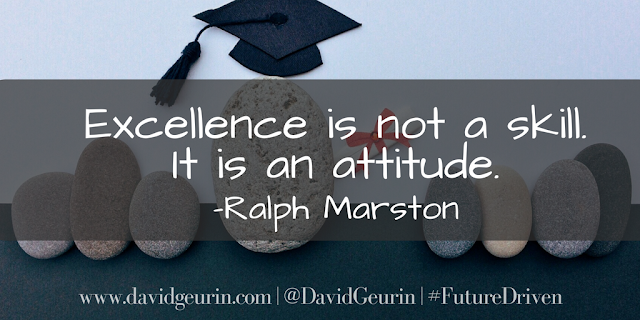"How did you become a Chicago Cubs fan?"
I asked the question to a Cubs fan I was visiting with recently. And I wasn't being sarcastic, since I'm a St. Louis Cardinals fan, and that would be on point for fan behavior between the two teams.
No, I was just curious because he wasn't from a part of the country that isn't typically considered Cubs fan territory. He explained that some members of his family were Cubs fans but what really hooked him on the Cubs was when he attended a game at Wrigley Field (Chicago) as a young boy.
That experience, he said, was something he never forgot and resulted in his lifelong love of the Cubs. It was as simple as that.
Experiences are powerful. They can change our entire perspective for good or bad. In this case, a positive experience resulted in a deep attachment to a baseball team.
I'm wondering about how students experience school. Are we creating experiences that result in a lifelong attachment to learning? Are we creating powerful learning experiences that develop curiosity and cultivate interests?
While much of my own school experience was somewhat routine and mostly forgettable, there were some amazing experiences that really led me to want to learn more.
Most of those memorable experiences were projects or trips to visit interesting places. I remember visiting a cave, a Civil War battlefield, and even a museum with a real mummy, all part of opportunities through school.
I also remember creating a news broadcast and interviewing people from our community, as part of a project for class. I also remember competing in a stock market game, and I remember performing a classroom play.
I don't remember a single lecture from school. I take that back. I remember one very gifted social studies teacher who could tell stories from the Civil War that were so interesting I wanted to learn more on my own. He had us on the edge of our seats.
I don't remember any worksheet tasks standing out. I don't remember any tests in particular.
Here's the thing. I'm not saying tests, or assignments, or routine work are all bad in school. I'm not saying they don't have value. But if we want our students to be inspired learners, we better look for ways to connect learning to positive emotions. We better give students experiences that really capture their attention in ways that go far beyond the routine.
In a time where standards mastery seems to be at the top of all priorities, I wonder what types of experiences kids are having?
What type of experience are they having when remediation has been routine for them year after year in school?
What type of experience are they having when they don't have the opportunity to pursue things they're interested in?
What type of experience are they having when they don't get to learn outside the classroom by taking field trips?
A couple of high school principals were discussing how they are making sure any field trips in their school tie directly to meeting standards. I guess that's one way to look at it.
But for me, I want our students to have as many opportunities as possible to learn and interact with interesting people and places away from our school campus. I especially want that for our under-resourced students who might not ever have those opportunities otherwise.
There is a time for rolling up our sleeves and doing the routine work of learning and life. But if we're not also creating peak moments along the way, we are missing the joy in the journey.
And we're probably missing out on potential passions, and maybe even missing out on developing a passion for learning.
The routine work should flow from a deep sense of purpose. We need to know our why. That's where lasting learning is nurtured.
As I wrote in my book, Future Driven,
Don’t just create lessons for your students. Create experiences. Students will forget a lesson, but an experience will have lasting value. We want to do more than cover content. We want to inspire learning.Is your school making time for powerful learning experiences? I want to hear from you. Leave a comment below or respond on Facebook or Twitter.



